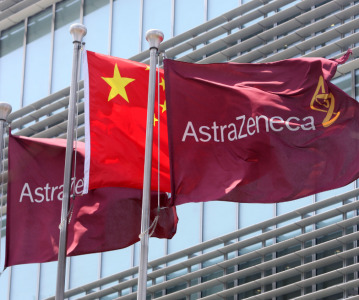Ixekizumab demonstrates rapid, improvements as among patients with moderate-to-severe plaque psoriasis

In a combined analysis of UNCOVER-2 and UNCOVER-3, significant improvement of psoriasis plaques was observed in patients treated with ixekizumab at 1, 2 and 4 weeks.
Eli Lilly and Company has announced that treatment for moderate-to-severe plaque psoriasis with ixekizumab resulted in clinically meaningful improvements as early as one week, compared to patients treated with etanercept or placebo. Detailed results of this combined analysis of UNCOVER-2 and UNCOVER-3 were presented during the American Academy of Dermatology (AAD) Annual Meeting taking place 4-8 March in Washington, DC.
UNCOVER-2 and UNCOVER-3 are double-blind, multicenter, Phase III studies evaluating more than 2,500 patients with moderate-to-severe plaque psoriasis across 19 countries. In these comparator studies, patients were assigned to receive either placebo, etanercept (50 mg twice a week) or ixekizumab (80 mg every 2 or 4 weeks) for 12 weeks, following a 160-mg starting dose.
This combined analysis evaluated the speed of onset of clinical improvement as measured by mean percentage improvement in Psoriasis Area Severity Index (PASI) score from baseline, as well as time to PASI 50 and PASI 75 among patients treated with ixekizumab, etanercept or placebo. PASI measures the extent and severity of psoriasis by assessing average redness, thickness and scaliness of skin lesions (each graded on a zero to four scale), weighted by the body surface area of involved skin.
"Studies have shown that clinical improvement observed early during psoriasis treatment can help predict clinical response at later times," said Craig Leonardi, lead study author and clinical professor of dermatology at St Louis University School of Medicine. "In this analysis of ixekizumab, early results were seen in patients with moderate-to-severe plaque psoriasis, an extensive and difficult-to-treat disease. According to patients and their dermatologists, rapid clearing of psoriasis plaques is one of the most important attributes for treatment success."
Significant differences in mean percentage improvement of psoriasis plaques were observed among patients treated with ixekizumab compared to etanercept and placebo:
Treatment with ixekizumab also resulted in clinically meaningful improvements (PASI 50) as early as 1 week, which were statistically significantly different compared with etanercept and placebo.
Median time to PASI 75 was 30 days among patients treated with ixekizumab every 2 weeks and 85 days among those treated with etanercept.
The majority of treatment-emergent adverse events were mild or moderate. The most frequently reported adverse drug reactions were injection site reactions and upper respiratory tract infections (most frequently nasopharyngitis) and generally did not lead to treatment discontinuations. Overall, the safety profile was comparable to etanercept in these two clinical studies.
Ixekizumab is the company's investigational medicine for the treatment of moderate-to-severe plaque psoriasis and active psoriatic arthritis.
Related News
-
News Google-backed start-up raises US$600 million to support AI drug discovery and design
London-based Isomorphic Labs, an AI-driven drug design and development start-up backed by Google’s AI research lab DeepMind, has raised US$600 million in its first external funding round by Thrive Capital. The funding will provide further power t... -
News AstraZeneca to invest US$2.5 billion in Beijing R&D centre
Amid investigations of former AstraZeneca China head Leon Wang in 2024, AstraZeneca have outlined plans to establish its sixth global strategic R&D centre in China. Their aim is to further advance life sciences in China with major research and manufact... -
News Experimental drug for managing aortic valve stenosis shows promise
The new small molecule drug ataciguat is garnering attention for its potential to manage aortic valve stenosis, which may prevent the need for surgery and significantly improve patient experience. -
News How GLP-1 agonists are reshaping drug delivery innovations
GLP-1 agonist drug products like Ozempic, Wegovy, and Mounjaro have taken the healthcare industry by storm in recent years. Originally conceived as treatment for Type 2 diabetes, the weight-loss effects of these products have taken on unprecedented int... -
News A Day in the Life of a Start-Up Founder and CEO
At CPHI we work to support Start-Up companies in the pharmaceutical industry and recognise the expertise and innovative angles they bring to the field. Through our Start-Up Programme we have gotten to know some of these leaders, and in this Day in the ... -
News Biopharmaceutical manufacturing boost part of new UK government budget
In their national budget announced by the UK Labour Party, biopharmaceutical production and manufacturing are set to receive a significant boost in capital grants through the Life Sciences Innovative Manufacturing Fund (LSIMF). -
News CPHI Podcast Series: The power of proteins in antibody drug development
In the latest episode of the CPHI Podcast Series, Lucy Chard is joined by Thomas Cornell from Abzena to discuss protein engineering for drug design and development. -
News Amgen sues Samsung biologics unit over biosimilar for bone disease
Samsung Bioepis, the biologics unit of Samsung, has been issued a lawsuit brought forth by Amgen over proposed biosimilars of Amgen’s bone drugs Prolia and Xgeva.
Recently Visited
Position your company at the heart of the global Pharma industry with a CPHI Online membership
-
Your products and solutions visible to thousands of visitors within the largest Pharma marketplace
-
Generate high-quality, engaged leads for your business, all year round
-
Promote your business as the industry’s thought-leader by hosting your reports, brochures and videos within your profile
-
Your company’s profile boosted at all participating CPHI events
-
An easy-to-use platform with a detailed dashboard showing your leads and performance







.png)